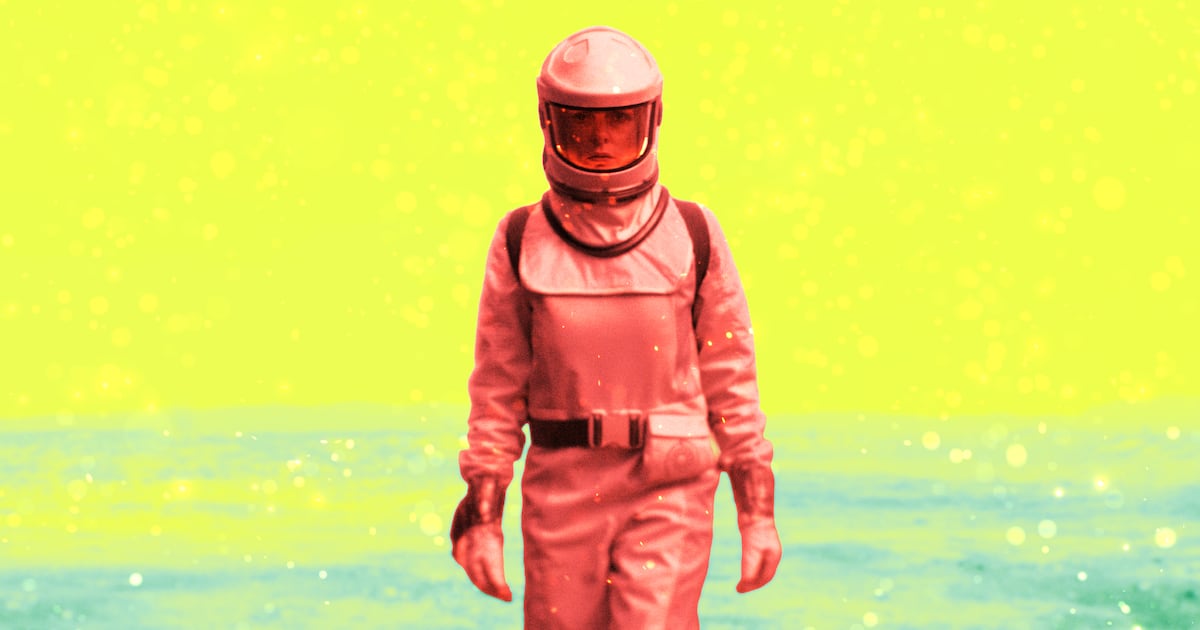In the four-year hiatus Black Mirror has taken in between its fifth and sixth seasons, the world has become a dystopian version of itself. A lot has changed since 2019’s Season 5 release, back when we had no concept of “social distancing,” the color of New York’s sky was a reassuring pale blue instead of hot orange, and Jack Dorsey was still the CEO of Twitter. Now, as Charlie Brooker’s sci-fi anthology returns to Netflix, the series has to compete with the bleak realities our society faces.
Can the return of Black Mirror rise to the occasion? Yes and no. This season satirizes our obsessions with deepfake technology—apt, especially when a new movie like The Flash recreates the likeness of the late Christopher Reeve as Superman—as well as true crime television and DeuxMoi’s hunt for untapped celebrity gossip. The new season also includes a couple of stories that aren’t as much social commentary as they are intriguing science-fiction concepts, a la the episodes “San Junipero” and “Playtest.”
Unfortunately, while this season tries to tap into that original Black Mirror techno flair, none of the five episodes rise to the occasion of the horrors we’ve seen in 2020 and beyond, also failing to live up to the high standard the series has set for itself. Black Mirror isn’t shocking or quite as entertaining as it used to be. The technology has fallen flat—nothing will compare to the brutal rating system devised for “Nosedive” or the futuristic reality competition show created for “Fifteen Million Merits”—and without that, the stories become bland and unoriginal.
Black Mirror Season 6 starts on its highest point, “Joan Is Awful.” The episode features Schitt’s Creek star Annie Murphy as a bad boss, who faces a comeuppance when a streamer releases a show based on her life. After firing an employee (Ayo Edebiri), dropping a vape on their head from a balcony above, and cheating on her husband, Joan returns home to unwind with some TV. The show she turns on, Joan Is Awful, stars Salma Hayek (playing herself) as Joan, who goes through the exact same story beats as we just saw happen to the real Joan. Joan tries to end the TV show by suing Streamberry (read: Netflix), but the streaming service has procured all the rights to her likeness and is using a deepfake version of Hayek to create the new story daily.
If, like me, you started watching Black Mirror by jumping around from season to season, watching only the most acclaimed episodes, stick with Season 6’s “Joan Is Awful” and call it a day. While this episode is the season’s best, that says something about the show’s weakened quality, considering it’s a less-funny, less-charming version of Stranger Than Fiction. But if, by chance, you wanted to watch a few more episodes that are just alright, you could check out the next two as well: “Loch Henry” and “Beyond the Sea,” two darker mysteries that work well when paired together.

“Loch Henry'' once again leaves poor Industry star Myaha’la Herrold stranded in the middle of nowhere with no cell service, a harsh recreation of her situation in Bodies Bodies Bodies. This time, though, she’s not at a mansion in Chappaqua—she’s in a sleepy Scottish town with her boyfriend. American Pia (Herrold) and local Davis (Samuel Blenkin), who is from the small town, stay a few nights in the nearly abandoned area, where they plan to shoot a nature documentary. Pia quickly changes course, however, when she discovers the real reason the town is so empty: A serial killer known as Iain Adair has tortured and murdered so many people that the rest of the townsfolk have abandoned their homes.
Pia opts to make a true-crime documentary about the murders instead of a bland nature film. Davis takes issue with this, seeing as Iain killed his police officer father. The entire episode’s thesis can be boiled down to a line from Davis: “That’s real,” he says of the murders. “That’s not fucking content.” Tell that to Netflix, which has produced many true-crime series and is aiming for an Emmy with Monster: The Jeffrey Dahmer Story, a dramatization of a real murder.
The ending is fairly predictable, albeit enthralling, and the same goes for “Beyond the Sea.” Coming in at nearly 80 minutes in length, Episode 3 is one of the longest of the season, though its story doesn’t merit the overlong runtime. Still, don’t be dissuaded by the half-hourlong set-up “Beyond the Sea” uses to get itself in order. Once the sci-fi story does get to the meat, it’s entrancing. In an alternate 1969, two astronauts, David (Josh Hartnett) and Cliff (Aaron Paul), fly up to space to work on an unclarified project together. While their corporeal forms exist on the space shuttle, they also send their souls back down to Earth to live in robot bodies for most of the day. In space, they spend almost the entire time up lying in a chair, instead living life simulated through the robots. They only come back into their space bodies when they need to complete the required physical exercise portions of their day.

Back on Earth, though, David and his family are killed by a cult with a stance against scientific process. Because Cliff can tell his coworker misses Earth so much, he offers David a chance to go back down—now, though, David will have to send his soul into Cliff’s body, when he completes the physical portion of his day in space. Slowly, David becomes obsessed with Cliff’s life and body.
Here, Breaking Bad’s Paul must play three different versions of himself: Cliff’s real body in space; his fake robot body back down on Earth; and David-as-Cliff, when David lives vicariously through his coworker. How long can you live with your soul in someone else’s body? How do you process grief through gaining a new family? The harrowing story comes close to brilliant, though it would be better with a half hour shaved off the less-alluring beginning and end sequences.
Black Mirror loses focus in its last two episodes of the season, “Mazey Day” and “Demon 79.” The former follows a down-on-her-luck paparazzo (Zazie Beetz), who jumps at the opportunity to expose starlet Mazey Day (Clara Rugaard), after Mazey causes a tragic hit-and-run accident. Both unfunny and hard to look at—the sepia color palette in this episode is distracting, as opposed to the brilliant blue-light hues of Black Mirror’s older seasons—this penultimate episode has nearly no merits, especially after an outlandish payoff that’s wildly out of tune with the rest of the story.
But the worst of the season is “Demon 79,” only because it’s been done before. Another overlong episode, the chapter hones in on Nida (Anjana Vasan), a lowly shoe sales associate at a department store, where she spends her days fantasizing about murdering mean customers and her racist boss. Those daydreams come to life, when a demon (Paapa Essiedu) visits Nida, insisting that she must kill three people in three days, or the world will face armageddon. While the retro-horror tone of this episode is fun, that’s about the only positive element—the rest feels like a rip-off of Paul Tremblay’s novel The Cabin At the End of the World (adapted by M. Night Shyamalan as Knock at the Cabin, released in February), with cheesy humor and lackluster kills.

This season of Black Mirror may be decent enough to pull in fans of the show, who are starving for new episodes, but the series is no longer pushing the needle forward in terms of sci-fi television. Some of the strongest episodes in the series’ history involve lighter satire, packed with a biting sense of humor, but none of these new installments have any of that sharp, critical edge. Plus, this season leans too much on packing episodes full of big stars—while some performances (like Aaron Paul’s) do make a great mark, seeing bigger celebrities in each new episode becomes more of a disturbance than an attraction.
Perhaps the real world has out-Black Mirrored the series. How do you parody a society that is already a comical dystopia in its own right? With no mind-boggling tech, no witty satire, and no unique stories, it’s better to just watch the daily news than this new season of Black Mirror.








